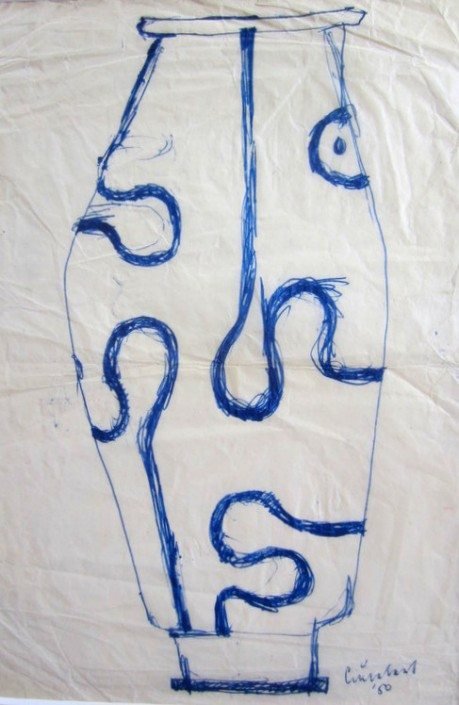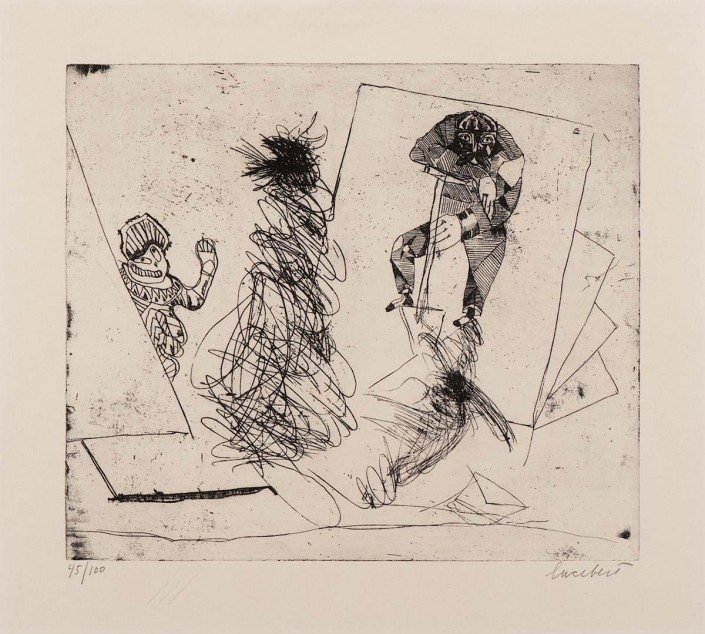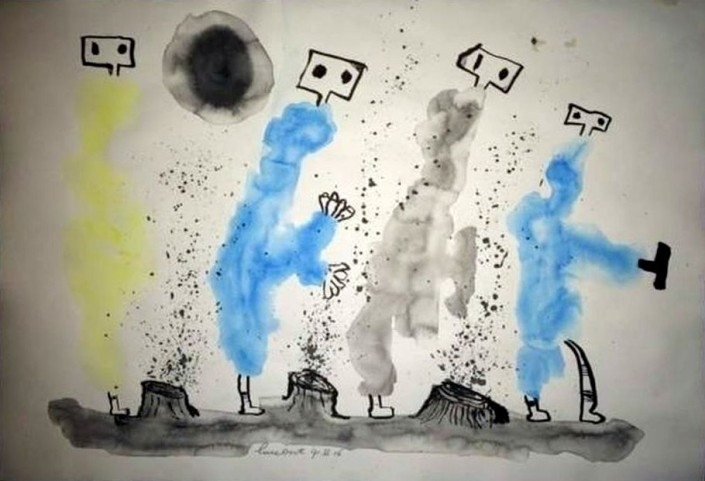Lucebert (Amsterdam 1924 – Alkmaar 1994)
pseudoniem voor Lubertus Jacobus Swaanswijk
Lucebert was een Nederlands dichter en schilder. Als dichter werd hij gezien als de voorman van de beweging van de Vijftigers, een progressieve groep dichters die na de Tweede Wereldoorlog begon te experimenteren met vorm en inhoud. Als schilder was hij nauw betrokken bij de Amsterdams poot van de experimentele Cobra-groep. Luceberts vader was huisschilder en had een eigen zaak. Luceberts tekentalent werd ontdekt na de ULO toen hij bij zijn vader begon te werken. Met een beurs ging hij een half jaar naar het Instituut voor Kunstnijverheidsonderwijs in 1938. Daarna sloeg hij aan het zwerven. Hij maakte deel uit van verschillende dichterscollectieven, waaronder IPA, Contact en later de Cel Majakovski, met Gerrit Kouwenaar en Jan Elburg. Deze laatste, die verwees naar de Russische dichter Vladimir Majakovski, zou opgaan in de Experimentele Groep in Holland. In 1949 trad Lucebert op als voorman van de Beweging van Vijftig of de Vijftigers, de groep experimentele dichters die destijds veel stof deed opwaaien. In 1953 ontmoette hij in een café zijn toekomstige echtgenote, Tony Koek. Ze gingen in Bergen in Noord-Holland wonen en zouden onafscheidelijk blijven. In de jaren zestig legde hij zich vooral toe op de beeldende kunst, die destijds ‘figuratief-expressionistisch’ genoemd werd. Zijn schilderwerk, dat vooral in het begin sterk beïnvloed was door Cobra, geeft blijk van een vrij pessimistisch wereldbeeld. Vanaf 1981 brak met de bundel Oogsten in de dwaaltuin een nieuwe creatieve dichtperiode aan, waarin zijn poëzie zwarter en toch ook socialer was. Lucebert overleed in 1994 op 69-jarige leeftijd in een ziekenhuis te Alkmaar. Tegenwoordig wordt Lucebert beschouwd als één van de grootste Nederlandstalige dichters van de twintigste eeuw. Bekend van hem is de dichtregel Alles van waarde is weerloos uit het gedicht De zeer oude zingt uit 1974. De zin staat sinds de jaren 80 (of eerder) nabij Station Rotterdam Blaak in grote neon-letters op de dakrand van de Willem de Kooning academie, inclusief zijn naam. Ook op de gevel van café Trefpunt in Gent staat de dichtregel.
Lucebert was a Dutch poet and painter. As a poet, he was seen as the leader of the movement of the Vijftigers, a progressive group of poets who began experimenting with form and content after the Second World War. As a painter, he was closely involved with the Amsterdam branch of the experimental Cobra group. Lucebert’s father was a house painter and had his own business. Lucebert’s talent for drawing was discovered after the ULO when he started working for his father. With a scholarship, he went to the Institute for Applied Arts Education for six months in 1938. After that, he started wandering. He was part of various poetry collectives, including IPA, Contact and later the Cel Mayakovsky, with Gerrit Kouwenaar and Jan Elburg. The latter, who referred to the Russian poet Vladimir Mayakovsky, would merge into the Experimental Group in Holland. In 1949, Lucebert acted as the leader of the Movement of Fifty or the Fiftiers, the group of experimental poets that caused a great deal of commotion at the time. In 1953, he met his future wife, Tony Koek, in a café. They went to live in Bergen in North Holland and would remain inseparable. In the sixties, he focused mainly on the visual arts, which were then called ‘figurative-expressionist’. His paintings, which were strongly influenced by Cobra, especially in the beginning, show a rather pessimistic worldview. From 1981, a new creative poetry period began with the collection Oogsten in de dwaaltuin, in which his poetry was darker and yet also more social. Lucebert died in 1994 at the age of 69 in a hospital in Alkmaar. Lucebert is now considered one of the greatest Dutch-language poets of the twentieth century. He is known for the line of poetry Alles van waarde is weerloos (Everything of value is defenseless) from the poem De zeer oude zingen (The very old sings) from 1974. The sentence has been in large neon letters on the roof edge of the Willem de Kooning Academy since the 1980s (or earlier) near Rotterdam Blaak Station, including his name. The line of poetry is also on the facade of café Trefpunt in Ghent.
Foto in 1987 gemaakt door Rob Bogaerts





